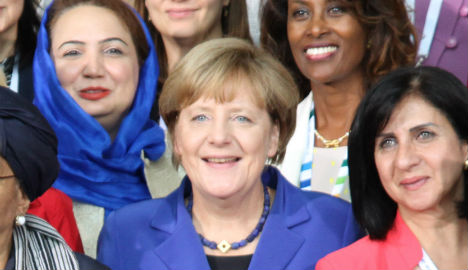NOBEL
Angela Merkel tops Peace Institute Nobel tips
Every year Kristian Berg Harpviken, Director of Oslo's Peace Research Institute (Prio) speculates on the likely winners of the Nobel Peace Prize. And every year he's wrong. Will this year's tip, Angela Merkel, buck the trend?
Published: 6 October 2015 09:40 CEST

German Chancellor Angela Merkel at a UN summit for women's rights in Berlin. Photo: Anne Marte Vestbakke / NTB scanpi
In a blog post written to accompany this year's predictions, Harpviken concedes that with 273 candidates nominated this year, his chances of successfully picking out who will be announced as the prize's winner on Friday are slight.
“Why keep up with this practice, which started with my predecessor here at Prio?” he wrote. “Not just are the chances of actually predicting the winner very slim. But even the announcement of personal favourites and predictions are enough to cause a stir.”
He argues that Prio, as an agency studying peace and war issues has “a duty to contribute to the debate” on what the Nobel Peace Prize should be for, and that attempting to pick winners based on the correct criteria helps keep the five-person Norwegian Nobel Committee on track.
1. Angela Merkel
In 2015, he believes the German Chancellor Angela Merkel deserves the prize “for staking out a more humane course in the European response to the mounting number of refugees”.
“In a time when many have dodged responsibility, Merkel has shown true leadership and risen above politics, taking a humane approach in a difficult situation,” he writes.
The German chancellor has already been nominated by a group of German Members of Parliament for her role in brokering a ceasefire in Eastern Ukraine.
2. Columbian President Juan Manuel Santos and Timoleón Jiménez, leader of the FARC rebels.
The leaders of the two sides of the 50-year war have shown, he argues, “commitment to a peace process that carries strong promise of bringing the Colombian conflict to an end”. He notes that the two sides “have thrashed out vital components of the peace treaty, and set a date for its finalization”. According to Harpviken giving the two an award “would definitely be in Nobel’s spirit”.
3. Russian newspaper Novaya Gazeta and its editor Dmitry Muratov
According to Harpviken the newspaper has bravely continued “to challenge political developments in Russia and its immediate neighbourhood, despite the loss of several journalists in violent attacks”. “With Russia’s state security apparatus severely restricting the space for public expression, drawing attention to its few remaining independent media would send a strong signal,” he argues. “There are other leading media outlets in Russia that could merit similar attention, including the Echo of Moscow radio station and the TV station Dozhd, but Harpviken believes Novaya Gazeta – alongside Muratov – is the more likely candidate.”
4. Article 9 Association, Japan.
According to Article 9 of Japan’s post war constitution, the state commits to “forever renounce war as a sovereign right of the nation and the threat or use of force as means of settling international disputes.” Last year, the government of Prime Minister Shinzo Abe started to reinterpret the article, bringing in ‘Peace and Security Preservation Legislation’ in September this year. The new law allows Japan to cooperate militarily in international operations and to take part in collective self defence. Abe has also announced an amendment to the article itself for 2016. The Article 9 Association is the most prominent group campaigning against this. “A return to a principle often hailed in earlier periods of the Peace Prize would be well timed,” Harpviken says of giving the award to Article 9.
5. Jeanne Nacatche Banyere, Jeannette Kahindo Bindu and Denis Mukwege.
Congolese gynaecologist Denis Mukwege is a veteran Nobel runner-up, having been put forward by Harpviken frequently in the past. His Panzi Hospital in Bakuvu, which treats women subjected to sexual violence in the ongoing conflict int he Eastern Congo, has been lauded internationally. Mama Jeanne and Mama Jeannette, run a church network which has since the early 2000s worked to identify survivors of sexual violence across the countr to ensure that they receive treatment and help. “By awarding the trio’s local, grassroots and on-the-ground actions with a Nobel Prize, the Nobel committee has a chance to strengthen the visibility of sexual violence as a global problem,” Harpviken writes.



 Please whitelist us to continue reading.
Please whitelist us to continue reading.
Member comments